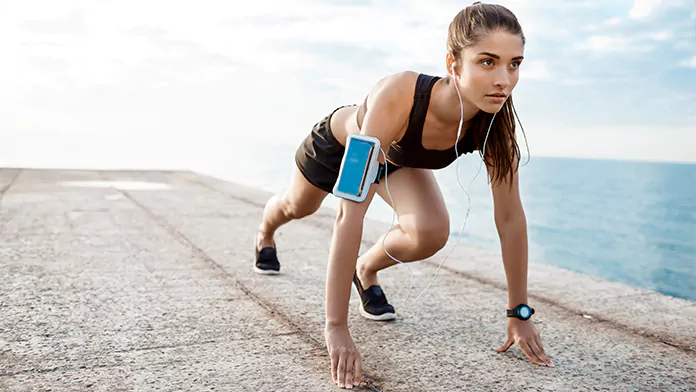Exercising is essential for keeping oneself fit and healthy. But, too much exercising can put your health at risk, especially your reproductive health. Hence, knowing how much to exercise and what exercises to perform is necessary.
We all know how exercising can help modulate ovulation in women having ovulatory dysfunction like PCOS– one of the prime causes of infertility. However, over-exercising can cause harmful impacts, as the female body is designed to take limited physical strain and pressure. Over-exercising can not only lead to physical injuries but can also impact females fertility and reproductive health.
Women trying to exercise excessively need to be wary of their reproductive health. According to the cohort study, an increased risk of anovulation is seen in extremely heavy exercisers (>60 min/day). But exercising 30-60 min/day is associated with a reduced risk of anovulatory infertility.
However, moderate exercise of a minimum of one hour a day and five hours a week can benefit fertility and reduce the risk of ovulatory issues. Women who are obese and experiencing infertility can benefit from strenuous exercise to a certain extent. But, highly not recommended for women with optimal BMI.
Regarding IVF outcomes, research titled “Maternal physical and sedentary activities about reproductive outcomes following IVF”, mentions that certain physical activities can benefit IVF treatment success. But exercising too much can aid in decreasing the IVF success rate.
In this Article
Reproductive Health Benefits of Exercising
Exercise, physical activity, and an active lifestyle contribute to weight reduction and improved physical and mental health. Exercises are known to boost the body’s cellular functions and overall metabolism. Exercising does not necessarily imply working out in the gymnasium. It can also be any physical activity that can,
- Raise your heart rate
- Warm-up your body
- Increases breathing rate
Some of the potential benefits of exercising pertaining to gynaecological health include:
- Exercising before and after conception can aid a healthy pregnancy and childbirth. Medical studies have proven how being active before and during pregnancy can decrease the risk of pregnancy issues like gestational diabetes and preeclampsia.
- Certain exercises and physical activities help regulate ovulation in reproductive-aged women. It also helps treat conditions such as anovulation (no or delayed ovulation) and ovulatory disorders.
- Exercising during pregnancy can alleviate back pain, constipation, and other pregnancy symptoms. It also helps ease labour and the pain associated with it.
- Exercises reduce mental health issues, such as stress, anxiety, depression, and mood fluctuations.
- Regular exercise is a must when you are on a weight-loss program and have fertility issues. Weight loss and exercise together can boost fertility in women trying to get pregnant while aiding a healthy pregnancy.
- Exercises bring about a hormonal imbalance in the body.
How Does Over Exercising Affect fertility?
Over-exercising is a strict no for women having normal weight. If a woman with normal weight performs rigorous activities, it may lead to ovulatory issues, causing luteal phase defects.
The luteal phase is the time between ovulation and menstruation when the progesterone levels are rising. Progesterone helps ovulation, fertilisation, and implantation. Luteal phase defects may decrease progesterone levels, impacting the implantation of the fertilised egg and increasing the likelihood of infertility.
Women often are asked not to lift heavy weights as it can exert pressure, straining the lower abdomen. It can also cause internal injuries to the organs of the reproductive tract affecting fertility.
Know What Strenuous Exercises are to be Avoided
Moderate exercising like walking, yoga, swimming, jogging, running, and swimming is healthy with respect to reproductive health. However, check with your physical trainer and doctor to know what works the best according to your body weight, health, and reproductive status. Here is a list of exercises that come under the strenuous activity belt and are to be avoided by women.
High-Intensity Interval Training or HIIT
HIIT exercises are high-intensity exercises that help burn fat quickly and effectively. These exercises are to be performed within 30 to 60 seconds each. They include pedals, squat jumps, sprints, push-ups, and others.
Powerlifting
Refrain from pulling heavy weights that help strength building. Also, lifting heavy weights and objects can cause wearing and tearing of the lower abdominal tissues that can affect the reproductive anatomy.
Frequently Asked Questions
Why do we feel exhausted after exercising?
When you perform strenuous tasks, the energy reserves (ATP) in your body get utilised and depleted. This can make you tired or fatigued.
How do I know if I am over-exercising?
Too much exercise can cause the following.
- Extended muscle soreness,
- Increased injuries and pain,
- Excessive fatigue,
- Lowers energy levels,
- Feeling exhausted after a workout,
- And palpitations or increased heart rate.
Can exercise affect your period?
Too much exercise can lead to changes in hormones associated with menstruation, causing no bleeding or excessive bleeding during periods and in between periods.
Conclusion
Exercise is good for your overall health. And for those who are obese or overweight exercising regularly is paramount for weight loss. But, for women, exercising more than required can affect reproductive health and fertility.
In such scenarios, knowing how, how much and when to exercise is a must. If you are looking to lose weight and improve fertility through exercise, you will need to consult your doctor and follow guidelines on the exercises to be done and avoided for good reproductive health.




